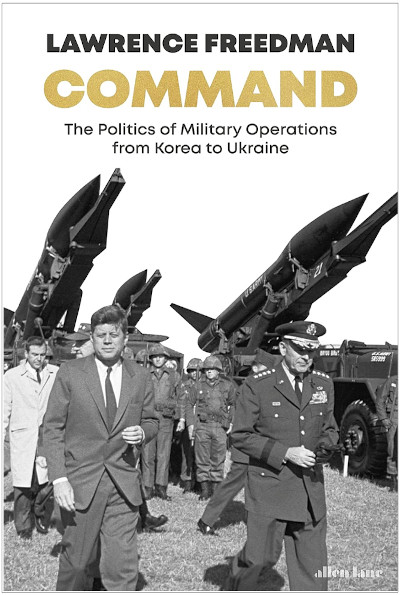In the picture
Cover of Lawrence Freedman's book 'Command. The Politics of Military Operations from Korea to Ukraine' (Milton Keynes: Allen Lane, 2022) 589 pages.
Lawrence Freedman is undoubtedly one of the most representative figures in the world of strategic programs of study , discipline relatively young academic, but with a tradition in the Anglo-Saxon world that dates back to the late nineteenth or early twentieth century, and has left such distinguished names as Mahan, Basil Liddell Hart, Bernard Brodie or Colin S. Gray.
Command' is the latest publication of this prolific scholar of strategy, author of such relevant works as 'Strategy: a History,' 'Nuclear Deterrence' or 'The Future of War: a History', not to mention the great 'The Official History of the Falklands Campaign'. On this occasion, Freedman offers a degree scroll that, without belonging to the genre of Military History, makes profuse use of episodes in which he exhibits his erudition to penetrate into the fields of political and strategic leadership and civil-military relations, discipline which in the Anglo-Saxon environment is known as 'Civil-Military Relations' degree scroll , which studies and analyzes the nature of the interaction between the political level, the armed forces and the society of a state, and is interested in the way in which military leaders relate to the political power that controls them, to which they must subordinate themselves.
In a very attractive way for the reader, the author delves into the traits that a good strategic leader must have, and analyzes the interaction between the spheres of the purely political and the military, which are found in what the specialized literature frequently refers to as the 'civil-military nexus', in which both overlap, so that the political leader penetrates into the military to supervise and, if necessary, take the reins of strategy and the conduct of the war -something that, according to Cohen, must necessarily happen- while the military command offers technical and professional advice that, however, must necessarily happen, if necessary, take the reins of strategy and the conduct of the war - something which, according to Cohen, must, of necessity, happen - while the military command offers technical and professional advice which, however, must be 'political' in the sense that it must understand and take into account the considerations and constraints inherent in decision making at that level.
Professional skill , efficient use of available resources, communication skills, empathy, the use of moral criteria, a sense of responsibility and concern for subordinates appear at the beginning of the book as the essential traits of military command at this level. To these, Freedman adds others such as personality, determination, intuition (which Clausewitz called 'coup d'oeil'), determination, judgment or -as highlighted by Marshall, the brilliant soldier-politician who excelled both as a general and as a politician manager of American foreign affairs in the mid-20th century- political sensitivity, essential for the performance of the military in the civil-military 'nexus'.
The book consists, fundamentally, of a collection of vignettes -one per chapter- taken from contemporary military history and ordered with a certain chronological criterion that starts in the Korean War; in each one he raises some challenges or concrete aspects inherent to the command at the political-strategic level. Using a very agile and attractive prose, Freedman makes a display of synthesis to strip the vignettes of all superfluous historical information, and of analytical capacity to identify the essence of the problem he is trying to illuminate, together with its keys.
Chapter by chapter, the book visit includes such well-known episodes as the friction between President Truman and MacArthur over the strategic direction of the Korean War, which resulted in the general's dismissal; the resistance of the French armed forces to the withdrawal of Algeria, which reached resource to terrorist tactics; General Sharon's tendency to ignore orders received in combat; and the tension that arose during NATO operations in Kosovo between General Clark, the American general who held supreme North Atlantic command in Europe, and British General Mike Jackson, head of the NATO ground force in Kosovo; that of the tension that arose during the NATO operations in Kosovo between General Clark, the American general who held the supreme North Atlantic command in Europe, and the British General Mike Jackson, head of the allied ground force stationed in the area to carry out, if necessary, a ground deployment in Kosovo; or that of the disagreements in Iraq and Afghanistan over the results of the operations, over the meaning of the term 'victory', or over the level of forces needed to achieve it.
After leading the reader on this exciting journey, the author concludes the book by distilling in the last chapter some of the recurrent issues that arise in the exercise of strategic leadership. Thus, issues such as the tensions caused by the scarcity of resources or the imposition of political limits to military operations; those derived from the growing complexity of strategic command and the direction of military operations, aggravated when these involve allied armies; those related to the personalities of politicians and soldiers; or those associated with complex or erroneously designed organizational Structures are shown.
If anything, however, Freedman wants to emphasize in this book, it is the idea that civilians and the military must remain within their respective spheres of influence, without interfering in each other's, but constantly engaged in an intense dialogue in which the latter, always recognizing the vital importance of civilian supremacy, give honest and clear advice on the realism of policy options while the former, recognizing the importance of the professional judgment of their military advisors, monitor and verify that the operational plans they design support and are aligned with political objectives. This close interaction, based on mutual respect, is the essence of healthy democratic civil-military relations, and the core topic of the firm and effective strategic leadership that Freedman so aptly analyzes in this book, a must-read for any scholar of these fields at knowledge.

